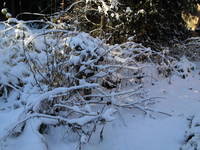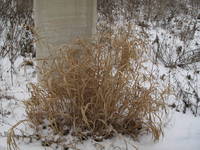Winter does a garden good: Many plants need cold weather to thrive in spring

Janice Leach | Contributor
Winter transforms the garden too. Snow and ice bring out textures and shadows we don’t normally see. Wintertime gives gardens and gardeners a much needed rest period, although we can keep pretty busy with planning and dreaming.
Winter also provides plants with vernalization, which is a requirement for some species.
Vernalization is a physiological process in some plants where the flowers, or sometimes the seeds, must go through a prolonged period of cold in order to blossom or germinate in the spring. The amount of cold required by a plant is measured in chill hours. (If I read this chart correctly, we get about 1,400 chill hours annually in our area — brr!) In terms of species of fruit trees, apples have the highest chill requirements, followed by apricots and peaches. Nuts trees and berry bushes also have varying chilling requirements.

Jim Leach | Contributor
So what’s a little cold then, if it means we get to grow apples and peaches and berries? I’ll put on a sweater and settle in with my seed catalogs and garden plans and think about spring.
View more snow-covered garden pictures here.
Janice and Jim Leach garden a backyard plot in downtown Ann Arbor and tend the website 20 Minute Garden.


Comments
Monica Milla
Wed, Dec 29, 2010 : 10 a.m.
P.S. Ann, the editors at annarbor.com often change the headlines, which is beyond the contributors' control.
Monica Milla
Wed, Dec 29, 2010 : 9:59 a.m.
Winter is a good rest for the gardener, too! :) Ann, tomato seeds are not harmed by the cold and can sometimes reseed all on their own. In fact, the SEEDS of many annuals can survive whereas their foliage can't. And many other plants (and all trees and shrubs) need the cold to signal going dormant. In fact, things that are perennial here in MI (such as gaillardia and echinacea) are ANNUALS in warmer climates such as Californis--because there the winter is rainy and the foliage doesn't actually die back and it gets mushy and dies. Seriously.
Rork Kuick
Thu, Dec 16, 2010 : 8:58 a.m.
I do nothing to remove leaves from my flower gardens until spring, and even then some beds I just never remove them. I fantasize that it conserves moisture and keeps the ground warmer in late fall, and in early spring it keeps the ground colder, so my plants don't shoot too early. I figure it helps my perennials herbs (iris, peony, rudbeckia, lilies), and my biennials too (forget-me-nots, foxglove). Some folks fear overwintering of pest insect species, but I think it promotes overwintering of the predators as well. There may be a few plants like roses where it's trickier (remove their leaves, and apply others). I clean up my vegetable space early though, trying to warm it up. I'm curious who the winners have been in the warm winters (it's rarely below 0 F anymore) of the past decade or more. I worry that it has advantaged some of the invasive plants. -20 F isn't happy days for some of my plants, but perhaps some of the really wicked stuff will hate it even more. Sadly, I don't think that slows the autumn olives down, but maybe garlic mustard overwintering is reduced. How about glossy buckthorn or black jetbead?
treetowncartel
Tue, Dec 14, 2010 : 10:06 p.m.
I have a question. I have grown lazy over the years and don't clean my gardens in the fall anymore. Is this good for my perenials and my vegetable gardens? I've noticed that I get some free plants in the spring of species I thought were only annuals, e.g. tomatoes and lettuce. I'm guessing this is most likely from the seeds being allowed to hang out all winter.
Ann English
Tue, Dec 14, 2010 : 7:10 p.m.
You start the article saying that cold temperatures are good for gardens, but give no specifics about which garden plants benefit from them. What about beefsteak tomatoes, like the one at the top of this article? Do they benefit from the cold? Then you give specifics regarding tree and bush food that does benefit from the cold. Does "Winter does fruit trees and bushes good" sound acceptable as a headline? I'd only read about plants growing from the ground benefiting from winter before now.